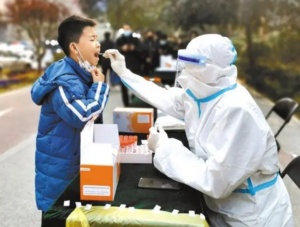
After the Spring Festival, new changes in the number of people visiting major medical institutions in Shanghai! Experts expect
After the Chinese New Year of Dec.
Shanghai major medical institutions
New changes in the number of people seeking medical treatment
The number of fever outpatients and emergency cases dropped significantly
Full recovery of outpatient clinics (especially specialist clinics)
Average daily outpatient volume continues to rise
Many of them have returned to their pre-epidemic status
At the same time
The number of newly infected patients has decreased
The number of patients with serious illnesses has decreased sharply
Many severe cases have been successfully treated and discharged from the hospital

As seen from the hospital
The city of Shanghai has regained its smoldering atmosphere
Experts also expect
after the Lantern Festival
As people gradually return to their daily lives
Many hospitals may see a small peak in specialist visits
Emergency fever outpatient clinics dropped significantly and outpatient clinics returned to normal
Huashan Hospital of Fudan University emergency medicine shows: on the first day of work on January 28, the number of emergency visits to the General Hospital was 436, a slight increase compared to last year, and 405 emergency visits on the 29th; ambulances were 40 and 38 in the last two days, a significant drop compared to the previous period and a slight increase compared to last year. Offline outpatient volume Huashan Hospital has fully recovered, with a specialist attendance rate of more than 95% and outpatient volume recovering by more than 90%. “Some patients who were previously unable to visit the hospital due to the peak of infection have been coming one after another after the festival. It is worth mentioning that the Internet hospital does not close during the Spring Festival, and the business volume is basically the same as last year, which meets some of the patients’ consultation needs.” The head of the outpatient clinic said.


Waiting area of Huashan Hospital outpatient clinic

Fan Yiling, head of the outpatient and emergency office of Renji Hospital affiliated with Shanghai Jiaotong University School of Medicine, said: on January 30, the outpatient volume in the east hospital area was 18,884, about three times that before the Spring Festival, and the outpatient volume basically remained at a daily average of 5,000-6,000 for three days during the Spring Festival, “which has basically returned to the normal level, and the emergency consultation situation is similar to the regular situation in previous years. The average daily attendance is about 700-800, and the emergency vehicle transfer is around 30 to 50.” He said that some emergency patients have extended cardiopulmonary dysfunction and venous embolism after “Yang Kang”, but there are basically no new patients with infections.
“The average daily number of emergency outpatient visits in these days is about 9,000.” Zuo Keqiang, director of the medical division of Shanghai Tenth People’s Hospital, introduced that the total number of emergency outpatient visits after the holiday did not change significantly compared to the year before, but the structure of visits changed significantly. The fever clinic has seen the biggest change, from more than 1,000 visits per day in the middle and end of December last year to single digits now; the number of emergency room visits has dropped from the previous peak of 2,400 a day to more than 700, with a significant reduction in ambulances. The “popularity” of the general outpatient clinics has recovered, with the backlog of non-emergency demand gradually being released as the peak of infection passes.
Specialized clinics have fully recovered, with a significant increase in patients compared to the previous period
The recovery of the outpatient clinics has led to some changes in patient mix. “There are significantly fewer patients with respiratory diseases, with a rough estimate of more than 90 percent reduction.” Zuo Keqiang said, according to the “B class B management” standard, the number of new coronavirus infection among patients coming to the ten hospitals is no longer separate statistics. The number of patients with cardiovascular diseases, oncology patients, etc. is much higher than the previous two months. In addition, hospitalization, surgery, radiotherapy and other life-saving treatments at the Tenth Hospital have roughly returned to more than 80% of their usual levels, with more than 1,700 inpatients of all types. And just in time for the winter holidays, the ophthalmology consultation area was filled with many primary and secondary school students who came to check their vision and adjust their lens prescriptions.

Outpatient hall of the 10th People’s Hospital

In many specialized hospitals in Shanghai, outpatient clinics have also returned to normal levels. Within the Pediatric Hospital of Fudan University, the situation was stable during the Spring Festival. Shen Guomei, head of the outpatient clinic, told reporters that the general fever clinic is currently averaging about 100-120 people per day, with very few newly crowned infections. Ambulance fell to single digits. Outpatient clinics, specialist clinics fully recovered, 29-30 two-day specialist clinics reached a daily average of more than 5,000 people or so, including kidney disease, respiratory diseases I, gastrointestinal diseases, neurological field diseases, blood diseases back to before the epidemic, general internal medicine clinics in turn not many people. Experts revealed, “is currently in the winter holidays, many children take advantage of the holiday to come to the chronic disease follow-up, after the Lantern Festival consultation will also usher in a wave of small peak.”
In the Cancer Hospital of Fudan University, all specialist outpatient clinics have been opened, and the average daily outpatient capacity of the two hospital areas in the east and west has reached 8,000 people, basically restoring the state before the epidemic. The hospital is still trying its best to increase new outpatient clinics, while continuously optimizing the Internet hospital’s repeat drug dispensing link, so as to make it more convenient for patients.
The number of patients with serious illnesses has decreased sharply, but they still need to be protected
The reporter also learned from the Tenth Hospital, Yueyang and other medical institutions: there are almost no serious new crown infections still under treatment in the hospital, Shuguang and other hospitals still have single-digit patients with serious illness. The wards that were previously converted to treat seriously ill patients have now been transferred back to treat specialist patients. The number of seriously ill patients is also decreasing sharply in some general hospitals where Western medicine is the main focus, with serious patients being cured and discharged daily.
The orthopedic quintuplex ward on the 5th floor of the Surgical Building of Renji Hospital has been converted to an emergency ward, mainly for the treatment of critically ill patients. Meng Chao, deputy director of administration and chief physician of the Department of Family Medicine, introduced: there are currently 39 patients in the ward, two patients were discharged on the 30th, and five more patients are expected to be discharged today. “Since the conversion to an emergency ward, 91 patients have been admitted and 53 have been discharged. All patients are expected to be discharged in the next week or two.” Meng Chao said. Fan Yiling also said that the in-hospital emergency medical team at Renji Hospital will be disbanded as of Feb. 1, but still retains the possibility of being called up at any time to be ready.

Experts at Renji Hospital instruct patients to ventilate in prone position
Finally, experts suggest that the general public should still do a good job of personal protection when visiting the hospital after the holidays, especially by wearing a good mask, washing hands regularly and keeping social distance. In case of elective surgery patients, they should communicate with medical staff to assess the cardiopulmonary function and systemic indicators after the infection, and proceed with the treatment in an orderly manner and in a safe manner.


Average Rating